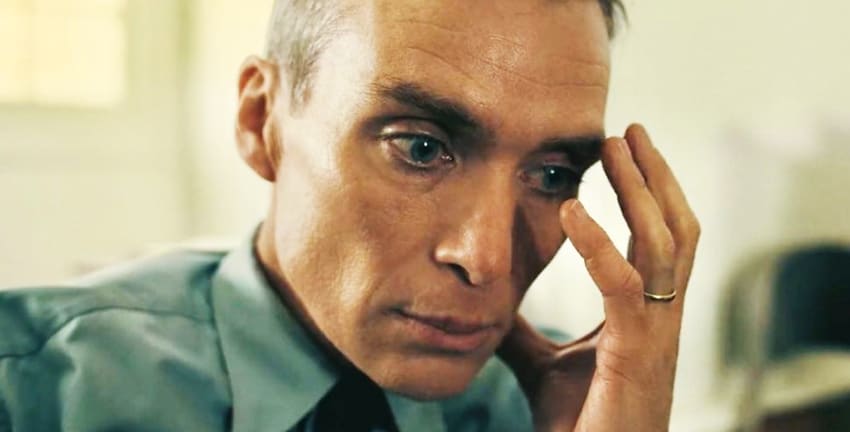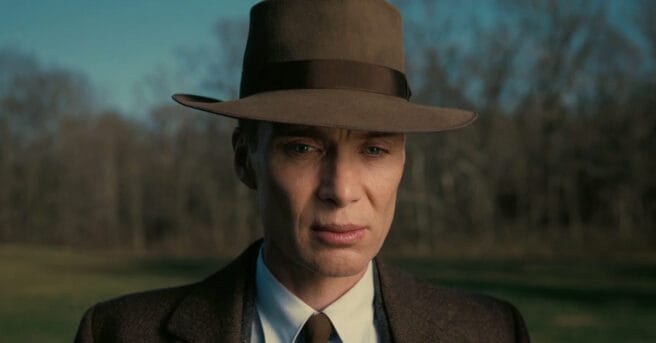Entertainment - Media News Watch originally published at Entertainment - Media News Watch
During a pivotal time in World War II, Professor Robert Oppenheimer is chosen by the army to head up the Manhattan Project. The focus of this project was to create the first nuclear weapon that Earth has ever seen. https://www.youtube.com/watch?v=tws_wdqjeMI
PLOT: During a pivotal time in World War II, Professor Robert Oppenheimer is chosen by the army to head up the Manhattan Project, the focus being creating the first nuclear weapon the Earth has ever seen. Gathering scientists from all over the world, Oppenheimer’s obsession with finishing the bomb before the Nazis has an overwhelming impact on his personal life, in ways both immediately obvious and impossible to predict.REVIEW: Christopher Nolan’s Oppenheimer is a startling, mesmerizing experience, not one easy to explain or sum up. It wouldn’t be Nolan if it wasn’t, but this film shows the writer-director in his prime as a storyteller and filmmaker, not to mention an expert time-jumper. Perhaps the most important film of the director’s career thus far,
Oppenheimer
is an old fashioned Hollywood biopic/historical epic in the way it’s filled with great actors giving their very all in showy roles while an undeniably crucial chapter in our history is told with no expenses spared. The film is a masterpiece of planning, from the casting to the production design to the dialogue (which is historically accurate). Nolan never misses a step; in fact, the movie is so packed with content that it feels as if it was a truncated version. It could have been longer. The movie is never boring or saggy. Nolan and his editor Jennifer Lame ensure that our attention is always drawn to the action on screen. J. Robert Oppenheimer was the man who spearheaded the development of Fat Man and Little Boy – the two atomic weapons used against Japan in the year 1945, which killed thousands of innocent civilians. The film chronicles Oppenheimer’s life leading up to the event and the long period following when he was subject to intense scrutiny by both the public and government (the latter suspected him of being a Communist party card-carrying official). Nolan doesn’t tell the story in a linear manner. He jumps around Oppenheimer’s life before and after 1945 to paint a complex portrait of a man so consumed by his genius that he couldn’t see the mammoth implications being such a genius could bring. You know the classic Ian Malcolm line in Jurassic Park about scientists being so preoccupied with whether or not they could that they didn’t stop to think if they should? It’s hard not to think of that during Oppenheimer
while watching the character as he frantically goes about orchestrating the creation of the ultimate world-destroyer; he’s latched onto the idea of building the perfect weapon, the morality of the project is mostly theoretical. It’s fair to say that the Nazis were the ones that he, and everyone else, had in mind when they created the bomb. But after their defeat, it was easy to pivot towards the Japanese as the war was coming to an end. The light comes on when it’s used. This complex and detailed character study shows how the man changes when he realizes what he has done. He is then pushed into his next monumental task – creating the nuclear bomb.
The performances, while some may be a bit theatrical, are all strong. Cillian Murphy’s magnetic wide-eyed intensity and natural intensity as Oppenheimer are the perfect match for this conflicted and thoughtful man. It’s not the most showy performance, but it’s needed because Oppenheimer’s often portrayed as a self impressed introvert whose emotions could be just moments away from bursting out of his cool exterior.
Matt Damon has all the fun in his roles as a blustery general and a bitter long-time colleague of Oppenheimer. It wouldn’t be surprising if either Damon or Downey Jr. received nominations for Best Supporting Actor (Downey Jr.’s final scenes are particularly impressive). Emily Blunt makes sure that Kitty Oppenheimer doesn’t come across as a typical movie wife. She portrays her in a gloomy, hard-drinking way. She has some of the most memorable scenes in cinema. There are many great actors in supporting roles. Benny Safdie, as a hardheaded member of Oppenheimer’s team, is a revelation. David Krumholtz excels as Robert’s most cynical friend. Dane Dehaan plays a sinister military man that is pivotal to Oppenheimer’s downfall. Macon Blair is fantastic as the scientist’s hardworking lawyer. It’s not unlike Oliver Stone’s JFK

, where it seems that every other role is filled by a recognizable actor. The movie is a bit too jam-packed with too information. It’s a problem that can be solved with repeated viewings. However, it is easy to get lost when characters are mentioning details, names, and places that we don’t fully understand. The subplots are constantly changing and the characters, both major and minor, are constantly jockeying for position. We almost need to use one of Nolan’s complex timelines to understand who is being mentioned in relation to what. The trailers might make you think that the movie is only about the making of A-bomb, but there are many other important aspects of Oppenheimer’s life that are also touched upon. Not least of which is his struggle to prove he is a loyal American, and not a Communist spying for the Russians. Yet all those strands ultimately tie together, and when you step back and look at the whole, you have to acknowledge the many different parts were necessary.
Technically, the movie is nearly flawless. The sound design of the movie is impressive. There are some real jump scares as Nolan bombards us with sudden shocks. Ludwig Goransson’s seemingly omnipresent soundtrack is as intense as Hans Zimmer’s score for the director. (Frankly, it might be too intensive at times. Hoyte Van Hoytema’s stunning cinematography steals the show a lot of the time, but not in a way you would expect. Nolan is as concerned with the faces and reactions of his characters as he with beautiful pictures. He often shows us his characters at extreme close-up. With this cast, he has a beautiful canvas to work with. The movie ends with a dark note that is impossible to shake. It would be easy to say
Oppenheimer is an anti-war film, but I think it’s more direct to call it an anti-ending-civilization-as-we-know-it film. Nolan’s intention was to shed light on the life of this difficult man, but he made a clear statement: what Oppenheimer started cannot be undone. If we are not careful, wise or lucky, it could all end within a blink of an eye. It’s not only a good film, but also a very important one. 8




